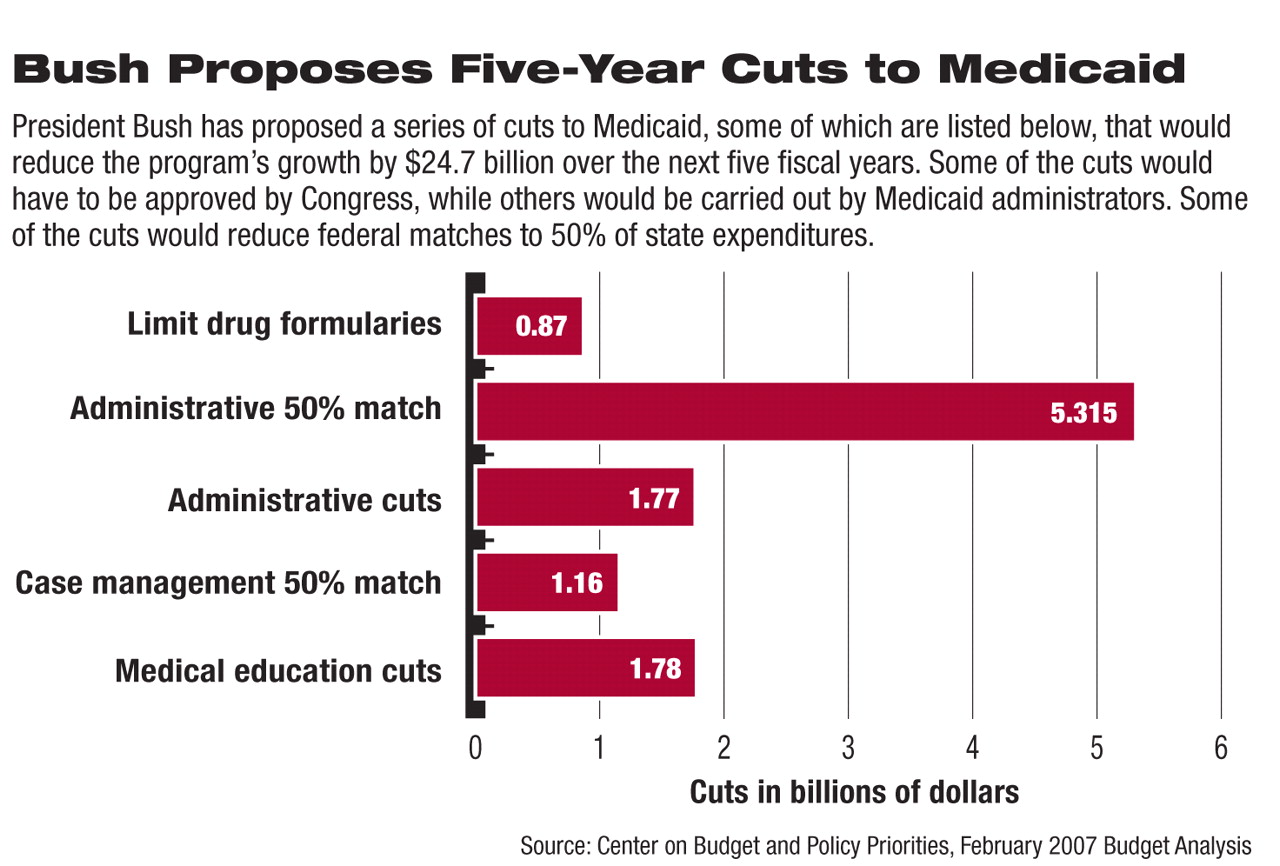Among a wide range of health care cuts President Bush has proposed in his Fiscal 2008 budget, mental health advocates are most concerned about proposals that would force states to drop hundreds of thousands of beneficiaries from Medicaid.
The Bush administration's $2.9 trillion proposed budget, introduced in February, includes a range of health care cuts that would reduce the availability of a variety of services for people with mental illness including drug addiction. The proposed cuts, which would impact Medicaid programs that address mental illness, the State Children's Health Insurance Program (SCHIP), suicide prevention, PTSD care, and juvenile-justice and housing grants, have left little for mental health supporters to celebrate.
“Everyone across the board is pretty upset about what is proposed for Medicaid,” said Lizbet Boroughs, associate director of APA's Department of Government Relations, about the administration's proposals that would cut $25 billion from the amount by which the program was expected to grow over the next five years. “That affects hospitalization, that affects medications, that affects case management, and that affects the daily lives of people with severe mental illness.”
Medicaid has risen to the top of APA's federal budget concerns because the federal-state partnership that provides health coverage for about 55 million poor people is the largest source of funding for mental health services. In 2007 the program will cost the federal government more than $200 billion, while states will spend about $150 billion. Most of the $24.7 billion in federal spending cuts would come from shifting to the states expenses now paid by the federal government.
The single largest Medicaid cut, $5.3 billion over five years, would come from reducing the federal-funding match for states to 50 percent. Some states rely on federal matches of up to 72 percent of patient costs to fund administrative functions required by federal regulations.
Most Vulnerable Targeted
Reduced spending also would include a $3.6 billion reduction in Medicaid's school-based transportation and administrative service functions and decrease services for children. Other cuts would include revised coverage of rehabilitation services to save $2.2 billion and elimination of reimbursements for graduate medical education to save $1.8 billion.
Another cut would reduce the federal contribution toward the cost of targeted case management for Medicaid recipients, including those with serious mental disorders, to save $1.2 billion over five years.
“Rehabilitative services are the critical services that enable people with mental illnesses to live in the community,” said a statement from the Bazelon Center for Mental Health Law, which was critical of the Bush budget. “They include skills training, illness self-management, peer services, intensive in-home services, therapeutic foster care services for children, and other interventions that promote recovery.”
Another key health care program that is facing large cuts, SCHIP, would lose funding for hundreds of thousands of beneficiaries over the next five years. Although SCHIP's mental health benefits are more limited than Medicaid's, mental health advocates have made it a priority to fight cuts that would limit eligibility to children from families with incomes at or below 200 percent of the federal poverty level.
Democrats and some Republicans plan to push for an additional $45 billion for SCHIP over five years.
A third major area of focus for APA is additional funding for the Department of Veterans Affairs (VA). APA opposed the Bush budget proposal for higher health care copayments based on veterans' incomes and urged an additional $500 million for mental health and substance abuse treatment each fiscal year through 2012.
“There is increasing need both in the number of service members returning from combat and in the severity of mental health diagnoses,” Joseph T. English, M.D., a former APA president, told the House Veterans Affairs Subcommittee on Health on February 14 (see
page 4).
Budget Includes Mental Health Cuts
The Substance Abuse and Mental Health Services Administration (SAMHSA) is facing a $76 million cut in its Center for Mental Health Services (CMHS) program that funds advances in mental health care and translates research into practice at the community level. Programs proposed for cuts are the State Incentive Grants for Transformation, which faces a $6.2 million reduction; school-violence prevention, which would be cut by $17.4 million; and jail diversion, reduced by $3 million. Two grant programs proposed for elimination are seniors' mental health and technical-assistance centers that support non-Medicaid patients.
The budget would freeze core CMHS programs at Fiscal 2007 levels. Among the programs that would receive no inflationary increase are those for the mental health block grants, children's mental health services, the protection and advocacy program, and the PATH (Projects for Assistance in Transition From Homelessness) program, which supports community-based outreach to people who are homeless and have a severe mental illness.
The Bush budget also would cut suicide prevention programs by $3 million, PTSD programs for youth by $1.5 million, and the Section 811 Supportive Housing Program for people with disabilities by $113 million.
Other cuts that would affect youth with mental illness are an $86 million reduction in juvenile-justice programs and elimination of the Office of Juvenile Justice and Delinquency Prevention. Both are critical, said mental health advocates, because estimates link 80 percent of youth in juvenile-justice facilities with mental illness or substance abuse disorders.
A number of factors complicate this year's budget picture. Democrats control both chambers of Congress by narrow margins and have vowed to reverse most of the president's proposed health care cuts. The situation gets complicated, however, because of the House Democratic leaders' commitment to a budget that is revenue neutral, known as PAYGO. Thus, any cuts that are restored require that congressional budget staff cut something else. Additionally, Congress uses the president's numbers as a starting point and will have to justify cuts to priority programs in defense or other areas or raise taxes to find the funds for health care programs.
“We certainly have a plan for lobbying to restore those cuts, which we're hopeful but not overly optimistic about because of the PAYGO environment,” Boroughs said.
Information on the president's proposed budget is posted at<www.whitehouse.gov/omb/budget/fy2008/>. Budget analysis from the Center on Budget and Policy Priorities is posted at<www.cbpp.org/>.▪

